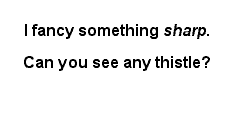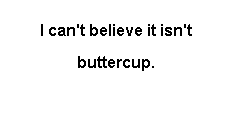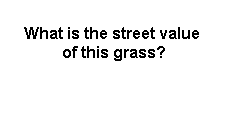Blog
Read it the right way round with the latest entry at the bottom.
| Date | Subject |
| 1 Jan 2011 | Frigidaire cars |
| 9 Jan 2011 | Find the gap |
| 16 Jan 2011 | Ready excuse |
| 23 Jan 2011 | Facebook profile banner |
| 1 Feb 2011 | HTML 5 |
| 10 Feb 2011 | Fuel protest |
| 16 Feb 2011 | Blank Wednesday |
| 26 Feb 2011 | Old code |
| 1 Mar 2011 | Pride comes |
| 16 Mar 2011 | Formats lost theory |
| 23 Mar 2011 | Fallout |
| 1 Apr 2011 | Archive media |
| 23 Apr 2011 | Ask me one on sport |
| 7 May 2011 | New toy |
| 9 May 2011 | Eighty-five percent |
| 21 May 2011 | Royal decree |
| 1 Jun 2011 | On the other hand |
| 7 Jun 2011 | Sheep talking |
| 12 Jun 2011 | Make a card |
| 16 Jun 2011 | In the foot |
| 19 Jun 2011 | TT tours |
| 23 Jun 2011 | Square one |
| 1 Jul 2011 | Wood for the trees |
| 2 Jul 2011 | Sense of direction |
| 9 Jul 2011 | Pookie-ackie |
| 12 Jul 2011 | Survival instinct |
| 20 Jul 2011 | Attributing authors |
| 21 Jul 2011 | New tricks |
| 1 Aug 2011 | Going digital |
| 8 Sep 2011 | Daybreak driver |
| 17 Sep 2011 | Exclusive Bond |
| 2 Oct 2011 | Farewell, good friend |
| 28 Oct 2011 | Looong shadow |
| 15 Nov 2011 | Accidents are a joke |
| 3 Dec 2011 | Without a fight |
| 26 Dec 2011 | In my beer |
Looking back at Ted Trett's photos of last year's Hidden Valley Rally I cannot believe I ever rode a solo motorcycle to Dragon and Elephant rallies.
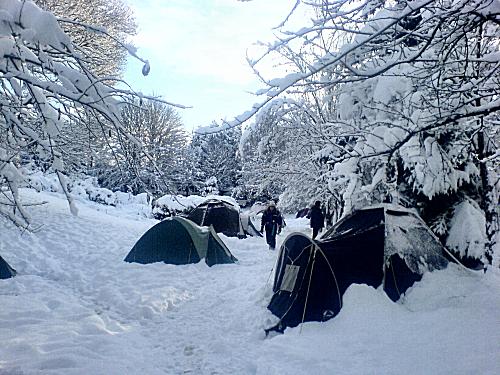
It isn't just the worry about sliding into something hard. The perishing cold makes me shiver at the very thought. These days I am only too pleased to be inside a car with the heater turned up full.
Some cars have preheaters and my old Volvo had heated seats as well as electrically heated windows and mirrors. Heated handlebar grips are about the most you can expect for a motorcycle.
Warm cars in winter may soon be a thing of the past. What will happen when highly efficient and carbon-friendly electric cars become the norm? How will you power heaters without significantly reducing range and speed? With internal combustion engines heat is a waste product. In the early '70s Derek Foster brazed a water jacket round just one exhaust pipe of a Panther split single to heat up a gallon of water in the sidecar. Does an electric motor generate enough waste heat to keep me warm? Will cryogenic efficiency leave everyone out in the cold?
Looking on the bright side, it should lead to a return to proper winter clothing; hats, gloves and an end to the stupidity of a "car coat" too short to keep your bum warm and legs dry.
Find the gap
Christmas shopping and New Year sales are always made difficult by the crush to find a car park space. Now we have the ultimate car accessory. It is a radio controlled helicopter with a camera unveiled by RotorConcept at the Consumer Electronic Show.
Launch the coptor from your car to a height that provides a bird's eye view of the car park. A picture is beamed to your laptop. Click on a vacant parking space to send the copter to hover in the spot, flashing warning lights and emitting a signal that your GPS system can home in to.
Motorcycles don't suffer the same parking problems, nor do they tempt you to buy truck-loads of unnecessary products.
Ready excuse
You know me well enough to expect a ready excuse for my bone idleness. Sit back and enjoy this one.
In 2008 I started writing an LPMCC.net blog to keep you informed about the back end of the website and the way my mind works [NOT]. I was full of ... er ... enthusiasm so that year's Blog ran to fifty nine entries and there didn't appear to be any problem because they were split into months.
By 2009 my ideas were being used up and my enthusiasm faltered. The past year's blogs were wrapped into a single page and it didn't go unnoticed that so large a page complained and took a long time to open. There were just twenty five entries through 2009, roughly every fortnight. Just enough to keep you bamboozled about the workings of LPMCC.net but not so many to slow the page down too much.
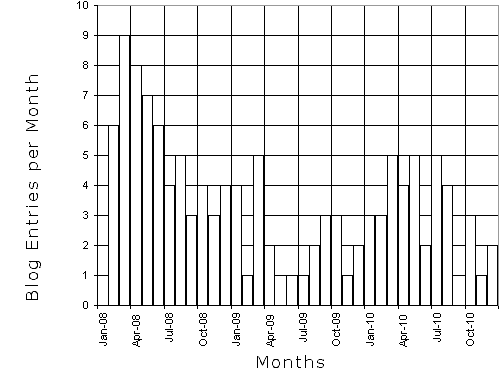
It was a dismal start to 2010 and the blog did not get off the ground until the middle of March, although you can hardly tell now because I cheated. I made the usual rash promises to update the blog weekly - which I soon failed - but the year saw a reasonable thirty seven entries, some covering subjects a little less dry than HTML and scripting.
The important discovery is that the 2008 blog still hollers with pain when it is whipped into action while the other years are a bit quicker off the blocks. Bottom line is that 59 entries are too many but 37 are OK.
So a blog every ten days on average should be ideal. Screw the "one a week" idea.
Facebook profile banner
Your new Facebook Profile shows five thumbnail size photos that are tagged with your name across the top. This is how to create a five picture banner of your own design.
- Choose a suitable photo or design. Keep it simple because it needs to be no bigger than 493 pixels wide by 68 pixels high.

- Check that the four vertical bars that divide the picture into five frames do not cut across essential content such as a face.

Click the above mask to open it in a new window then right click and save so you can use it to cover your scaled picture. - Copy and trim each of the five pictures inside the frames as a 97 pixel by 68 pixel image.
 Keep the scale the same but increase the canvas size to 130 pixels by 90 pixels with the picture at the top left.
Keep the scale the same but increase the canvas size to 130 pixels by 90 pixels with the picture at the top left.
Save the pictures.- Upload all five image files to your Facebook photos. It may be worth creating a new folder called Banners.
- View your photos after they have all uploaded to Facebook and tag each one in turn from right to left with your own name. They will be added to your list of tagged photos, each one goes to the front of the list as it is tagged.
- Check your new profile. Check it often because other photos will be added from the left as new photos are tagged with your name. Move your pointer over unwanted pictures and click the X at the top right to remove it.
I'm sure you will think of a suitable design that reflects your character.
HTML 5
It is coming and I am smacking my lips in anticipation. It will allow so many improvements to LPMCC.net. But I still need to wait for everyone to update their browser.

Most LPMCC.net viewers use Internet Explorer (IE) version 8 or under. Those versions do not show HTML 5 features. The full IE Version 9 is yet to be released and will not be available for Windows XP. If you want to stay with Internet Explorer and get the benefits of HTML 5 you may need a new computer!
Because I am keen to provide you with the advantages of HTML 5 I have started to record which browsers are used on LPMCC.net and there is a chart on the Statistics page. Things were shaping up well over 2010 but December shows a disappointing reversal to pre HTML 5 browsers, perhaps because a lot of new people visited the site.
A few non-essential features have already been added where it doesn't matter a great deal if they don't work.
The first applied feature is rounded corners. If your browser is HTML 5 enabled then the tooltip for the double underlined words will have rounded corners.
Another feature is the loading progress bar that appears briefly at the top of this page while the index is assembled ... or doesn't if you are on IE<9. Here is an example ... or not.
Can you see it?
The really exciting new stuff includes columns and canvas. No graceful degradation if they aren't working. Just a complex work‑around to cater for older browsers - or leave it out for awhile.
My advice is to install Google Chrome. It is free, fast, simple and stable plus you get the bells and whistles of HTML 5 without buying a new computer!
Fuel protest
Last week LPMCC.net published a link to Fair Fuel UK where you can add your name to a petition against further rises in fuel prices in the next budget. The government appears to be taking notice of recent petitions on the Number10 website but on-line petitions just allow armchair activists to air their grievance and then carry on twittering.
About the same time - and over the past several years - there has also been an email circulating encouraging recipients to boycott one particular fuel company. The logic is that the company will find it necessary to lower prices and that will trigger a price war.
Main problem with both approaches is that not enough people take part. If it were that simple, drivers would look for the cheapest fuel prices and not just drive into the closest filling station when the low fuel light flashes. But they don't. Here's why.
- Drivers do not plan ahead. You only need to see them drive to realise this. They don't know what colour comes after a green traffic signal (or what it means). They don't plan for hazards. They certainly cannot plan when to put in petrol. In short they give diddly-squat thought to any of their driving.
- Those who do consider the options (possibly when they receive that email) figure that the extra distance and time to drive to a cheaper supermarket service station outweighs the savings. Well, it would be worthwhile if everyone did but they just think of personal, short term benefit.
So why doesn't pecunairy fuel buying push down prices? Because not enough people will ever take part. Because not enough drivers pay for their own fuel.
That big new car being driven at ... er ... uneconomic speed is a company car driven on expense account. The driver doesn't give a hoot how much fuel he uses or how much it cost because he is not paying for it.
You are, the customer and the taxpayer. Grin and bear it.
Blank Wednesday
Just after midnight I arrived home after an evening with the lads and lassies at The Gate Hangs Well. Mick Ayriss had asked me to check links to his website and they seemed to be working OK. I made a note to clarify the web addresses on the Links page and then turned in for the night.
At 8 O'clock in the morning I checked my emails and noticed a message from my hosting company. They informed me that my data usage had exceeded limits on 15 Feb and they had removed LPMCC.net from the web. A quick check confirmed the dire news. LPMCC.net had disappeared.
P A N I C .... P A N I C ...
I followed the hosting company advice and sent a grovelling email begging for the website to be reinstated ... "It is currently taking 29 hours before we read your email"
I can't say I didn't see this coming. I already blogged about bandwidth problems last October and took steps at that time to head off trouble. Looks like it was a case of too little, too late. LPMCC.net had busted 10,000 visitors in December and January and now I was reaping the whirlwind.
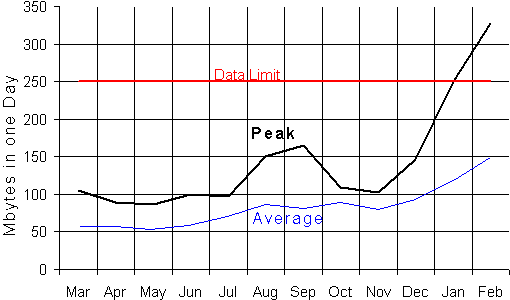
Typically unprepared for events I scoured the web for a replacement host company. It is a minefield. They all offer hosting for a couple of quid a month but the truth is that is an introductory offer that goes up X3 in no time. Eventually I went home to Easily.co.uk which is the company I register the domain name through. I have been with Easily since the beginning of the millennium but always thought their web hosting was a bit expensive. I few calculations showed that they are now very competitive for the service LPMCC.net needs.
There followed a fraught day of purchasing a Linux hosting package and transferring 200MB of LPMCC.net files to their new home, then attaching the LPMCC.net domain to the new location.
By 6.30pm LPMCC.net was back on-line thanks to the efficiency of the Easily people.
And thanks to you for coming back to LPMCC.net. I hope your experience of this website is as good as ever. There is a huge backlog of new content to add that has been delayed, luckily by no more than one day.
Old code
Back in the 1980s HM Stationery Office issued a new Highway Code. Motorcycle Sport, noting there was nothing new, invited readers to suggest updated rules for modern roads. Ron Bryan, my boss at that time, directed me to respond.
I could not think of any new rules that were better, nor any old rules that were unnecessary. I wrote with a few existing rules that would make the roads safer if only they were put into practice. Motorcycle Sport printed the whole lot.
I will not repeat them here except to say they included the Rule of the Road and the Golden Rule - and to note that they are still neither understood nor obeyed.
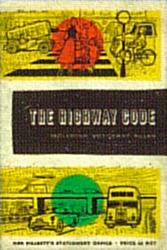
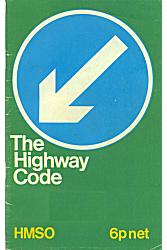
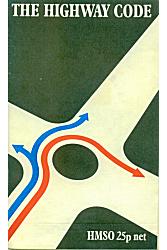
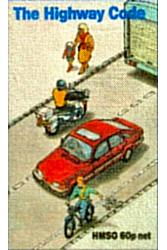
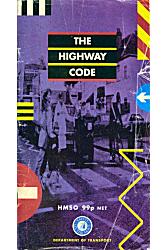
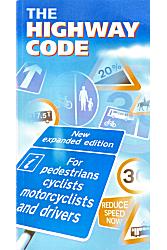
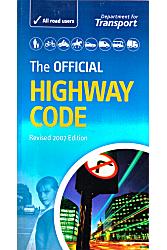
I admit that I learned most of the rules when the Highway Code cost one old penny!
When I watch the antics of other road users I wonder when they last read the Code. Then I worry that maybe they are right and it is me who is wrong. So I get out (the latest) Highway Code and look up the rules. Inevitably they are not as I recall. Over the years the Highway Code has been dumbed down. Here is an example:
Old Rule 81, New Rule 185 When reaching a roundabout you should give priority to traffic approaching from your immediate right...
Why are there twice as many rules now as when I started?
Roads and traffic have become more complex. Also the Highway Code is now much more instructional on how to apply the rules. The Driving Standards Agency has lost hope that drivers will RTFM (The Official DSA Guide to Driving - the essential skills Book) so they have bunged as much as they can into the Highway Code - thereby ensuring that isn't read either!
Pride comes
Recent months I have been cock-a-hoop about visitor numbers. Over ten years they finally broke through 10,000 per month in December and January. Despite only 28 days in February they looked on track to bust 10k again. Then disaster!
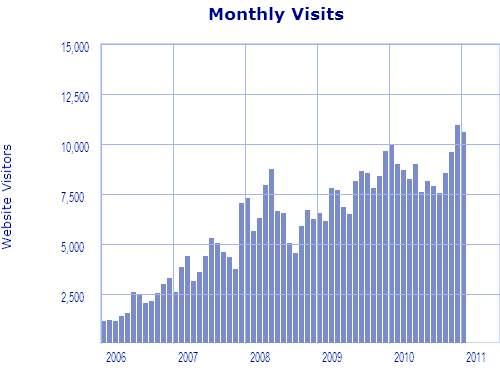
As recounted in my Feb 16 Blog all this apparent success had repercussions that resulted in LPMCC.net being pulled off the web. Within hours we were back on-line from a new server and I hoped it would be business as usual with just a short gap in our steady rise in fortunes. Not so ...
Exploring the statistics from the new server showed a significant difference between previous visitor numbers and post-Blank-Wednesday figures. In early February they were reported to be averaging over 350 visitors a day, 475 peak. Since then they have rarely bettered 100 on any day. Folk (yourself excepted) are quite fickle regarding websites. If they have a bad experience one day they go elsewhere and don't come back. It is the same reasoning that often leads landlords to ban bikers from pubs: One day there are motorcycles parked outside and his passing trade is ruined for a year.
So I did some further checks. Google Analytics confirmed my new server counts. It seems that my old provider was supplying optimistic figures. After the disaster of Blank Wednesday I am now suffering the indignity of realising those 10k visitors were just so much hype.
Why are the figures for unique visitors so different? Server log files record the URL of a visitor and count how many are different (unique) in each time period. If the time period is a day then returning visitors will be counted again next day. If the period is a month then the same visitor will not be counted again that month. There is a limit to how long the logs are kept so the figures are not absolutely unique. Also it is possible to discount BOTS (the automatic search engine browsers that gather index data) and discount my own URL - yes I do check LPMCC.net quite often!
My dilemma is what to do with the figures I have carefully recorded and graphed on the statistics page? Should they just carry on with a note regarding the sudden change of gradient? Should I make some attempt at converting them to align with the new figures? Or should they be dumped and started again from scratch? The last is the only honest option.
It is a shame to lose the historic data. The change does present an opportunity to collect a more representative record of LPMCC.net activity. So in future I will count page views, a number that has much more similarity between different analytic services.
The important thing is that you are here and LPMCC.net is here to welcome you.
Formats lost theory
It's thrilling to receive content for the website whether is is scanned badges, photos, or stories dragged from the depths of history. Content arrives in all forms and sometimes it is a puzzle how to access it.
Text may arrive in a Publisher file or as a .DOCX Word document. I could not get Microsoft's plug-in for my ancient copy of Office to open the new DOCX formats. Fortunately Open Office did what it says on the tin. If you want a computer experience that puts a smile on your face, install Open Office.
Dave Ranger sent lots of scanned photos from the past and moved on to digital photos for recent rallies. Two of his emails contained SnapfireShow files. What the ... ?
A bit of research showed that they are a format used by Corel similar to Powerpoint with image management and some editing features, now replaced by Media One Starter free version. That was Dave's pictures sorted.
Steve White gave me hundreds of excellent photos from his trips to Ashby Folville on second Tuesdays. As I worked through them I came across some .MOV video files. These play in the Apple QuickTime player and appeared to be High Definition! Ain't it great what digital cameras can do these days? Better than my video camera.
Trying to assemble the various clips into something for YouTube proved to be frustrating. MOV files will not open in my video editor. So I upgraded to QuickTime 7 Pro to unlock all the editing features.
The easy way seemed to be to convert the MOV files to something I can open in familiar editing software. AVI files are the lingua franca of video. In no time I was shuffling and clipping video and adding titles and transitions. Oops! Big problem. Steve's files are widescreen and my editor is 4:3 aspect ratio. The finished file was lovely quality but with squashed in pictures making everyone look anorexic.
Back to QuickTime in double quick time to learn how to top, tail and title the clips. For twenty quid QT7 Pro is pretty good value but it is not a video editing suite. I have yet to figure out if transitions are possible. Adding titles is a tedious process that would be accurately described as a "work-around" obstructed by an obscure manual.
This resulted in LPMCC.net's first 2½ minute, beautifully formed widescreen HD video. All half gigabyte of it! Uploading it to YouTube took three hours even at broadband speeds. It was done last night while my internet use is free!
This morning the video was in place and ready to embed into a new LPMCC.net Album. Another Oops! Transcription to YouTube format had stripped out the titles that I sweated blood to insert!
Just not good enough for the demanding standards of LPMCC.net viewers. So I exported the whole movie with titles to another AVI file. Quality not quite so good but the file was only just over 200MB, ie 40% of the MOV file. It is now ready for you to appreciate with some of last year's Classic Tuesday photos courtesy of Steve White.
Show us what you can do with Movie Mode on your camera.
Fallout
This week Steve White and Keith Herbert both received a bouquet of kittens for tipping me off about a serious website problem. Fallout from Blank Wednesday crisis. Forms essential for sending messages to me had ceased working.
When LPMCC.net migrated to a new host, all the forms still used a program on the old server to send information by email.
Last week I was foolish enough to tell the old host company that LPMCC.net was no longer delivered by them. Should have kept quiet. Within days Steve and Keith both reported problems with forms and helpfully sent copies of the error messages. Thanks to their vigilance and swift response I was able to fix it.
The 2010 Review noted that I had neither tackled PHP/MySQL nor moved to a professional server but might review that in 2011. Circumstances had overtaken me about the server and now the PHP came home to roost.
Blasted government cuts mean there is now only one PHP textbook in the county libraries and that is a month overdue for return. So I had to make do with a crash course using Web PHP resources and an O'Reilly PHP Pocket Reference I bought years ago and never read. To test the scripts I installed XAMPP Apache/PHP/MySQL from Apache Friends.
By yesterday the forms were working once more and I was delighted to receive additions for the 1962 Dragon from Pykey and the Flying Haggis from Gary Hough.
I have broken the ice with PHP so I may as well wade into the other features before necessity drives me into another panic. Thanks to the help of friends I don't think that we suffered much damage on this occasion.
Archive media
Recently the Club asked for a copy of the old Rules. I chuck nowt away and have a copy in the loft dating from the 1970s. It was originally printed using a Gestetner duplicator on absorbent blue foolscap paper. The printing quality is diabolical, it is creased up and dingy and I could hardly scan it. Each side needed scanning twice anyway, because of the size of the paper. But by scanning and retyping I was able to produce a copy in half an hour or so.
This week I needed to trace some old work I did in the 1980s. It was a document produced on a Sirius computer in WordStar and saved on a 5¼" floppy disc (when they really were floppy!). In the early 90s I had transferred the WordStar files as plain text onto 3½" discs using one of the last PCs at work that had both drives. I wanted to have access to the data from my own computer which at that time was an Amstrad CPC6128. It was fitted with a 3½" drive in addition to the onboard 3" double sided disc drive. I read the files using Protext text editor on a ROM. Switch on and the programme was instantly available. Oh, how we have progressed!
Working with floppy discs using a system without a directory tree structure required files to be rigorously indexed, a task my tiny ... er ... I mean tidy mind excelled at. Therefore, last week when I needed the data I had a neat A5 booklet to read through to determine where the data is kept. It pointed to two discs, the working disc and a backup copy that I made.
The discs themselves were exactly where I left them nearly twenty years ago, in a disc box filed in numeric order.
These discs are not the 1.4MB format that you may recall. They were format as 600KB low density discs in a special format that could be read by the CPC6128 and after a small alteration also read by a PC. The particular format noted on the disc label and the index is D20. I still have a couple of PCs with 3½" drives so I popped one in hopefully. It didn't work.
Next I dug out my old CPC6128. It took a few minutes to trace all the bits to get the 3½" drive wired up. But I cannot remember how to operate it now! So I had to sort out the manuals as well. Some of the keys no longer work - must have oxidised over the contacts. Same problem with the ROM board. Could not get it to appear at all. So there I was with the data in digital format but totally unable to access it!
Plan B. Read The Full Manual. I still have a printed version of the document. It was printed single sided on A4 paper using a Xerox copier. Luckily I didn't put the damned thing into plastic pockets else the black print bonds to the plastic and will not come out without tearing. The font was a nice, plain typface that we now call Courier, probably 12pt. It scanned well and, despite needing to do one page at a time, I OCRed with reasonable results. Of course, it makes a dog's dinner of the formatting, putting in tabs and spaces instead of adapting margins and indents. Still, it worked.
It is a similar story with photographs. Studio shots of my parents from before WWII and a few rare ones from the beginning of the 20th Century are still in excellent condition. They are sepia toned but extemely clear. Black and white snaps from the 50s are still crisp although a little dog eared. Colour photos from the Phoenix years, taken to the local chemist for processing at a reputable laboratory, are beginning to fade slightly. Slides and snaps from the 80s and 90s even if taken with a decent 35mm camera rather than a dreadful Instamatic, put through a One Hour machine by a till operator were pretty dire the moment they dropped from the machine onto the floor and fade every time they come into the light. I will not mention Polaroids.
I dread to imagine what will happen to our precious memories as digital formats change and we become unable to access media. It has happened already with music, 78s replaced by 45s and LPs. Reel-to-reel replaced by cassettes. CDs - mini CDs - and now as many digital file formats as you can shake a memory stick at.
Same thing with movies. Home films on 8mm (16mm movie film split down the middle) replaced by Super 8 then quickly on to VHS video, VHS C, umpteen digital tape formats and now, in time with the music, compression Codecs that vary in enough different ways to make viewing them an impossibility once the original equipment fails.
That is why it is vital to share what you have kept so that memories are preserved. Like ancient Greek knowledge that survived the fires of Alexandria to be collected by Muslim scholars and eventually make its way into western enlightenment.
Ask me one on sport
Whenever I'm asked a question I cannot answer my response is "Ask me one on sport"
Silly really 'cos sport is something I have no idea about. I lost interest in sport about the time I stopped playing cowboys'n'injuns and started to get interested in motorbikes and ... er ... other things.
Sports are graded from uninteresting through boring to anathema. Bottom of the pile is soccer. Especially the twats who talk about it. Kevin Brewin put it well many years ago when he noted that the only thing dafter than twenty-two grown men chasing a pigs bladder round a field is the thousands of idiots paying to watch them.
Therefore I was delighted to watch the news footage of Real Madrid on their bus tour to display the Kings Cup.
From now on, the question on sport that I can answer will be something to do with Sergio Ramos and the Copa del Rey.
New toy
I know I should be cracking on with the backlog of badges and reports from Dave Ranger, but this past few days I've been like a kid with a new toy. Not a motorbike - the interesting stuff in HTML5, specifically localStorage.
It is taking lots of research and experiments but I'm beginning to get to grips with it. More importantly I'm starting to imagine the fantastic improvements it will make to LPMCC.net.
Let me explain where we are at the moment.
Your computer needs to remember a few things about your visit to LPMCC.net to make your life easier and the experience more enjoyable. Here is the current list.
- When you visited so you are presented with a list of new content added since then (over on the left under New or Recent)
- The Contact Centre is there to take your jottings about a page, names of people and error reports. They are saved until you send them in or delete them. The Contact Centre also has a local bookmark tab so you can return to LPMCC.net pages.
- When you select badges for a T shirt you can return to your list to add or change it.
The first two of these keep your data from page to page and day to day using Cookies. These are small files specific to this computer and this website with this browser.
The third system is a peculiar - not to say idiosyncratic - way to retain a list by adding it to the page's address. It is kept for reuse if you add it to your bookmarks/favorites. It is a bit cumbersome but the advantage is that you can send the link to any other computer and it will still produce the same badge list.
Both of these methods have a distinct limit to the length of data that can be saved. Cookies only hold about 4KB which is not much more text than this blog entry. With localStorage the storage allocation for data leaps up to 5MB which is more than the 500 odd pages of rally reports. Should be enough!
One small drawback is that you need one of the newer browsers to make use of this HTML5 feature. IE8 works OK. Firefox, Safari, Opera and Chrome are fine. Older browsers may need updating.
Where will this be used first?
I am inspired by the hard work being put into assembling the definitive Rally List by Hans Veenendaal and Jan de Graaf. The data deserves as much attention lavishing upon it as I can spare. Development will include a way for you to choose and record which of the rallies you intend to visit and present it as an editable list. Also I am working on using Google Maps to plot the location of your rally list so you can plan your route.
Now you can see why I am so far behind with badges and reports!
Eighty-five percent
Saying 85% makes it sound very technical but this is only a nominal value for a qualitative judgement of slap-dashed-ness. It describes my philosophy to overcome expensive perfectionism.
Never give a job to anyone who boasts wickedly of being a perfectionist. There is no limit to the time and money that can be wasted on failing to achieve perfection.
It is all to do with the law of diminishing returns. Improving quality involves exponential increases of effort. I set my sights on a competent 85% for delivery of most things including LPMCC.net pages. Gaining another ten percent usually takes twice as long. Another few percent doubles the time again. And so it goes - much more effort with very little to show for it.
That is why today I posted the next incarnation of Hans Veenendaal's European Rally Lists with map plotting of rally locations. I know full well that some locations are not plotted and some are plotted on the wrong side of the world. It is 85% complete and correct and that is infinitely more than zero.
Now it is delivered I can take my leisure making it better. Perfection tomorrow.
Royal decree
Since the Royal Wedding a lot of riders are noting the interest that both Princes have in motorcycles. Some are attempting to take credit for encouraging this interest at an early stage.
I make no claims regarding Prince William and his motorcycling. As a mark of respect and loyalty I offer the above delightful photograph and encourage you to roll your mousewheel to zoom in on William's badge. So now you know what Kate sees in him!
I also have one of those ... and it's not for sale!
- Maria Luiza von Bloedau
On the other hand
Every morning an old sea captain with an impeccable record took a small box from his desk, unlocked it, read a slip of parchment, then replaced it in his desk drawer. When he eventually retired, his successor's first act was to open the drawer, unlock the box and read the slip of ancient parchment. On it was written the following advice ...
<— Port is Left - Starboard is Right —>
Many drivers don't know which side of the road they are supposed to be driving on. It is the RULE OF THE ROAD but for many it is just a rule of thumb - on the wrong hand!
Confusing left and right must be a common problem. A bit like knowing East from West. Through years of working with OS Maps I became adroit at working with Eastings and Northings in that order. Walk along the corridor then go up the stairs. I try to keep to the same convention for LPMCC.net scripts - width before height, left before top. Not important, just a habit.
Updating all the Google maps on LPMCC.net would have been a lot easier if I had realised it sooner. The convention for big maps is latitude then longitude. In other words NS then EW. It is hard to learn new tricks at my age.
Sheep talking
I don't make a habit of watching sheep, despite cruel rumours.
When I walk through a field of sheep I try to imagine what they are thinking. They must like grazing or they wouldn't do it.

People aren't sheep. We like new experiences. But I suppose our craving for new pastures is equivalent to sheep enjoying new grass. We always want more.
Make a card
Young Wishbone gets about on his RE and is always ready to chat with fellow riders who he meets. Trouble is, passing on the LPMCC.net website address is a bit ... er ... difficult with folk of our age. We know LPMCC stands for Leicester Phoenix Motor Cycle Club but the mnemonic is lost on strangers. I even write it in capitals so no-one thinks it is One Pee Emm Cee Cee dot net. You can get the website without adding the www at the front but if I leave that off it may not be recognised as a website address.
Any-road-up, to assist you to pass the word on to whoever you consider may enjoy the website, there is a page you can print out and cut up to make business cards for handing to fellow motorcyclists.
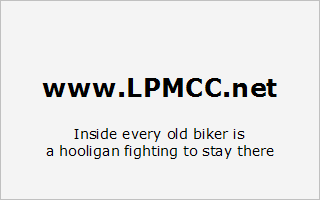
They aren't fancy-pants designs that will use up all your expensive printer ink, just black and white and to the point. They are also editable. You can change the strap-lines to your name or your own motto, either all together or individually. If you find you have changed something by mistake press f5 to reload the page as it was.
The instructions and the boxes round the strap-lines do not print.
In the foot
I have an inexhaustable ability to make small mistakes on LPMCC.net and sometimes a missing comma or failing to add a closing tag renders a page incomplete or invisible. So I am always grateful for warnings from viewers who take the time to let me know when summat is up. This week Russ Shand sent me a note to say the News page was acting peculiar.
The News was actually behaving exactly as it was meant to behave. If it is more than nine days old (ie one week plus a couple of days margin) it warns that there should be a newer page available by now and has a big PANIC button to press to look for it. At ten days overdue it goes looking for something newer without asking.
var tday = new Date();
var mod = document.lastModified;
var day = 1000*60*60*24; // milliseconds in a day
if ((tday.getTime() - mod.getTime())/day > 10){
location.reload(true);}
I always make my weekly deadline, more or less. So why was the News flashing the PANIC button? 'Cos of a small mistake or omission on my part. I wrote the News then forgot to post it onto the LPMCC.net server.
Small mistake - simple remedy ...
... except ...
Do you recall that earlier this year I was chucked off the web for exceeding bandwidth limits?
I check bandwidth occasionally to assure myself that the bandwidth use is under control. We were thrown off the old server for busting 250 megabytes in one day (Blank Wednesday). Since then on the new server the figure has always remained about 88 MB and has never exceeded 200 MB on any day - until Monday 13 June when it was 387 MB! My new Hosts are a little more forgiving than previously so we are still on line.
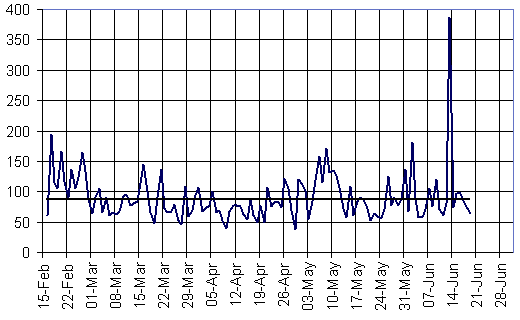
S l o w l y the two events began to congeal in my grey matter. The News page reached its smell-by-date on Monday 13 June. Bandwidth spiked on ... er ... oh my giddy aunt! The News page must have rattled away reloading itself and chomping into the megabytes.
So it looks like this time Russ let me know about a problem BIGGER than a missing comma!
The forced page reload was yanked off damned quick. In future I'll be using a different method to ensure you always see the latest News.
TT tours
At the recent National Rally briefing, Steve White recalled the Table Top Rallies that entertained us on club nights in the 60s and 70s.
These were conducted on OS maps - the club had access to several sets of 1 inch/mile maps of the Isle of Man. The idea was to follow clues to find our way around the map rather than on the road. Teams were shuffled to break up cliques.
Any-road-up, it reminded me that there has been a virtual-virtual rally on LPMCC.net for many years. It is not on the main menu system and is linked from just three places, the Club Meeting page, and two Megaphone transcriptions from the 1970s. It remained obscure because it was written very early in LPMCC.net history and didn't work in all browsers. I decided to fix it and in the process discovered the following...
- If a form element is disabled its value is not transmitted for PHP form processing.
- It is possible to use JavaScript to alter area coords but in Google Chrome the hot-spots are not updated and remain in the original position.
If you are interested in my work-around, hunt through the HTML behind the TT Rally page. Or you could always just click the link and wander round the 1960s highways and byways. The new version also makes the first use on LPMCC.net of localStorage to remember your position and how long you have taken when leaving and re-entering the page. It makes this a Table Top Time Trial.
You will need to know a lot about the Club to understand the Table Top Rally clues although it is made slightly easier because "tooltips" guide the way.
Square one
Right back in April 2009 LPMCC.net ran into trouble by exceeding data storage space. From that date the pictures on the site began to be distributed onto Cloud storage locations beginning with Flickr and then onto MSN SkyDrive. The latter is free for 25GB of storage. No fear of exceeding that limit. (If I did I'd open another FREE account).
The only problems with this distributed file system is that I have to upload the photos and then find their new web addresses to add to the LPMCC.net page. It is blinking complicated and roughly trebles the time it takes to add a page with photos because it all needs to be documented for the day when it unravels.
The day it unravels was yesterday, or near as damn it was.
MSN SkyDrive had a facelift. On the face of it, things look very good. Problem is I can no longer harvest the photo URL automatically. And the photo addresses are different which would really complicate the background scripts that make LPMCC.net operate with its customary faultless speed. (eh?)
Luckily there is no urgency because our new web host provides 1GB of webspace. Current files, including photos, are about one third of that. Hence forth new photos will be placed on the main LPMCC.net server and over the next few months the Cloud based storage system will be migrated back home. It remains to be seen what impact this will have on bandwidth.
I will be working on one folder at a time starting with the simpler/smaller ones. Help and Motorbike sections this week.
I depend upon you to let me know about missing photos.
Wood for the trees
Since I improved the format of the email version of the News page it is taking longer and longer to prepare every week, time I should be spending fixing a Trident. Coupled with that problem, I have heard from several friends that they missed vital bits of information, hidden away in the News. It sounds like I need to rethink this issue.
I did toy with the idea of updating the News monthly so you are not saturated with information. There are three things against that idea...
- There is always a lot to tell so a monthly version would be even bigger.
- Some events are at short notice or I want to remind you in the previous week.
- You would get cold turkey missing the weekly Foz Spot.
So the News will still be refreshed every week but I have changed priorities and will try to abbreviate content.
- Future events will be given greater prominence.
- Items will be less conversational bullet points.
In addition the News is being semi automated, drawing content directly from existing data. A lot of updates have been done this way for some time, including the mobile phone page.
Sense of direction
The National Rally special tests brought to mind one car park exercise we tried in road safety rallies at Leicester Cattle Market in the early eighties. In a completely clear space, riders were asked to ride as close as they could to a marshal about 25 metres away. Er ... ride blindfolded.
It wasn't a proper blindfold, it was a hood over the head with a fishing rod arrangement so an accompanying marshal could whip it off if necessary. And the target marshal was free to dodge. It was all perfectly safe. Except nobody would do it. Nobody!
Some did about a metre before banging on the brakes and yanking off the hood. It showed a strong preservation instinct that prevented riders from moving forward when they knew they couldn't see.
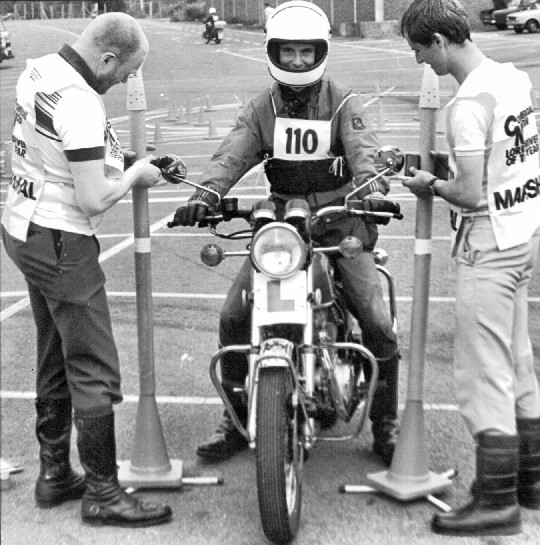
This is entirely different from the normal response of people who aren't looking where they are going. For some reason they still think they are in control despite looking at a passenger, kids in the back seats, SatNavs and tank top maps, text messages and jumbled CDs. And they do it at high speeds on busy roads.
There is a subtle difference between not seeing the road to be clear and not seeing the road to be obstructed. It is why drivers dip their lights in fog. Because seeing a white wall of light reflected off fog is more intimidating than looking into blackness. The blackness looks empty but in most circumstances full headlights will pick up hazards ahead before dipped lights will. (and others will see your sooner) You just need the nerve to try it and the sense to slow down for the conditions.
Sometimes when I'm walking alone in a clear space I see if I can take ten steps with my eyes closed. Even in a complete void my last few steps are shortened, I lean backwards and anticipate bumping into something hard. Then I open my eyes and congratulate myself for not falling off the edge of the world.
Yesterday, on one of my long country walks, I had a great opportunity to really test my courage. The footpath ran in a straight line for 150 metres across the middle of a completely unobstructed pasture. The animals were all browsing at the other end, well out of the way. I closed my eyes and counted one hundred paces.
The ground was a little uneven but ankle safe. After about ten paces I was aware that I had strayed slightly off the worn path, but didn't know which way. I was confident my inner compass was keeping me fairly well on track. Still, by ninety I was getting apprehensive and imagined I was striding into the far stile. I was quite relieved to reach one hundred and open my eyes.
I was totally lost!
It took me about a minute to work out where the devil I was. I didn't recognise the view ahead but tried to fit it in with my expectations. Didn't fit. Looking left and right I could see features I didn't recognise. Not from this position anyway. Gradually the map reassembled in my confused mind. I had walked in a big semicircle and I was fifty paces right of where I expected and facing back the way I came from.
So much for my unerring sense of direction. I can now understand how folk lost in jungles or featureless wastes manage to walk in circles. I was much better the second try because I compensated for my starboard drift and, despite being a few metres off to the left, at least I was facing the right way.
I guess it's time I bought a SatNav - for when I'm not driving.
Pookie-ackie
Laziness is a good reason to add data to the website just once and then refer to that single piece of data to display the information. It is the system that I use all over LPMCC.net, for menus, people, badges. If something is changed, all references are automatically updated. Or should be ...
Problems can occur if you, the reader, recently looked at the page with the old information. Your computer will behave efficiently and economically and cache the page. ie save it on your computer. When you look a day or two later after the data has changed, your computer very helpfully shows you the old version. You can get round this by holding down shift and pressing f5 or double click the top LPMCC.net title banner or click the menu link to the same page. Any of these systems will force the page to be reloaded from the remote server with the latest information.
I take special measures with some pages that are updated frequently. The News page has tags that tell your browser not to save it locally in the cache.
Most pages are not critical but some are. Specifically the events and runs. This year we are starting to go on motorcycle rides. If you don't let me know that you hope to attend then I cannot let you know about last minute alterations or cancellations. They are posted on LPMCC.net and I need to make sure you see today's version, not a cached copy of the old information.
The link to the full run information page from the programme index page is subtly altered every time it is clicked to make your server think it is being asked for something different each time. It therefore delivers the whole page with the new information. Do not bookmark (put in favorites) the page or you will be delivered old info from the cache!
That should ensure you get the latest start location and time or a note that the event is postponed or cancelled. What else can go wrong?
Plenty. If it can go wrong it will go wrong ... and it did go wrong.
This season is the first time we have put on a programme of Ride-Outs. There is a lot of information to store - dates, places, map references, postcodes, telephone numbers, website addresses, prices, friends attending ... The data was not all in one place. One set provided the programme page. Another set on each run page gave details. And more data shows the Calendar page. You can guess what happened. Yes, they were different! Depending on which page you looked at you could have started the Rockingham Castle run from different places and at different times. I had to go to both starts to make sure no-one was left in the lurch.
Any-road-up, all the runs programme data is now in a single file referred to by all pages.
It is tough work getting the Ride-Out programme up and running. I cannot lose credibility by making a pookie-ackie of the dates, times and places.
Survival instinct
Last weekend I walked along the Leicestershire Round stretch that overlooks Saddington Reservoir where I was entertained by a Pitts Special doing acrobatics. One trick was flying up until the aeroplane stopped and hung momentarily in the sky before the weight of the engine and drag of the tailplane sent it head first earthward.
Recent news highlights problems caused when airline pilots trust their instinct instead of following their training. Air France flight 447 on 1 June 2009, Colgan 12 Feb 2009, Caribbean Airways 14 October 2005 and Pinnacle Airlines 14 October 2004 are four examples where the plane stalled when climbing steeply. Speed dropped causing wing lift to fail to support the aeroplane. The correct procedure in such circumstances is to point the nose down and use gravity to increase speed, returning control and wing lift so the plane can be levelled off safely. When you are falling it is a natural instinct to point the nose up and this is fatal.
There are similar circumstances on the road. You cannot train for them because they are by definition life threatening. You have to learn the theory and have the composure to apply it when the time comes. Here are some examples.
- When skidding on a slippery surface, bang the brake on and off repeatedly. This used to be called cadence braking and is now achieved by ABS. The natural instinct is to press the brake harder. Drivers who do that and survive the resulting crash believe their brakes failed.
- Steer into a skid. This brings the wheels back into rotation with some control. The natural instinct is to try harder to swing the vehicle in the direction you originally intended, resulting in a spin or highside.
- In a tank-slapper, accelerate, then pull your weight forward and don't fight the handlebars. Instinctively you will want to fight the handlebars and apply the brakes. Your reactions against the bars are out of phase (elastic hysteresis) and amplify the oscillations. Applying the brakes adds more energy to the slap.
- If someone opens a car door that you cannot avoid, steer the bike into it. Apart from "don't get into that situation" - swerving away will crush you between the bike and the door. I suppose steering into it will throw you into the oncoming vehicle you were keeping left to avoid. Should have pulled up!
I know the first three work from experience. Touch wood I won't try the fourth.
When you are placed in these circumstances there are two types of reaction.
If you are lucky, everything goes into slow motion. You seem to have ages to figure out what you are doing and anticipate how much this is going to hurt.
Unlucky people freeze. If they survive they cannot recall anything.
Attributing authors
Content on LPMCC.net is generously provided by readers who take the trouble to share their memories of good times with friends, many of whom they have never met. I recognise the effort they make by including their by-line with the relevant content and also add their material to the Bibliography.
Google is now recognising the value of World Wide Web authors and will roll out a better way to indicate the source of content by including author profiles and photos in search results. See Google Webmaster Tools Help.
The author needs to add their LPMCC.net pages to their Links when they create a profile. This is because there must be a reciprocation between LPMCC.net and Google profile. Neither can make a claim on the other without a matching return link.
It is based on the person's Google Profile so the author needs to have signed up. Easy to do that. From the Google Homepage Click the Sign In link at the top right. Then click the Create Account link below the sign in box in the new window. (It's free)
I have recognised the effort that riders make to produce content since members wrote for Megaphone back in the 60s and 70s. Therefore I'm delighted that Google will give more prominence to authors. On Monday I set about introducing the system on LPMCC.net.
First I listed all the content pages against each contributor. At this date there are 333 contributors to LPMCC.net. Regrettably I only have email contact with about 90 of those. Emails were sent on Monday explaining the system and listing the addresses of pages that each person wrote or provided photos for.
If you didn't get an email it is because I've lost your current address so please get in touch to let me know your address and I'll send your list of pages by return.
I have also added a note on the Rally Report page asking for your Google profile address to include as soon as your report is added.
I can't afford to pay you for your reports but I'll spare no effort to see you receive deserved recognition.
New tricks
My youngest daughter is a lady of leisure who rarely rises before noon during school holidays. We were surprised this morning to see her out on the lawn at 9am, learning to juggle. Being a big kid at heart (and mind) I had to join her.
I keep running out of garden.
Sacha
Juggling is something I've never been able to do and they say you should learn something new every day. It's surprising how much exercise is involved in juggling. Well, learning to juggle. There is a lot of running and bending to recover the balls. This will take a bit more than a day to learn but it is a skill, and all skills come with practice.
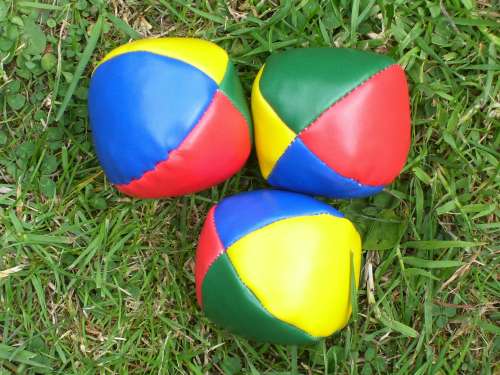
At first I thought that juggling three balls required me to pay attention to three balls. It quickly became apparent that it is just two things.
- Throwing and catching with the right hand.
- Throwing and catching with the left hand.
Couldn't be simpler.
With the theory nicely sorted I got on with the practice. Simple again ...
- Throwing consistently
- Catching intuitively
Figure out an optimum height to throw to. Not too high else it becomes too unpredictable. Not too low or it comes down too soon.
It was a very demanding task requiring a lot of deep concentration. I'm not very good at that. After awhile my mind wandered and "Hey! I'm doing it!" at which point I made a balls-down.
It's like learning to drive or ride a bike. At first you must concentrate on the simple control skills, clutch/throttle, brakes/balance. It is only when these become automatic that they become smooth. If you ever need to get home with a broken clutch cable, once you are moving pretend the clutch still works and you can change gear smoothly. If you are aware the clutch doesn't work, the more care you take the worse you crash the gears.
Over analysis has been known to ruin the fluid skills of "natural" performers. I'm certainly not a natural juggler so I'll just get out there for the exercise and try to think about the website while I'm picking up my balls.
I'll be able to juggle when my hands gang up on me and say "Keep outa this. We've got it under control."
Just so long as you stick to juggling balls, kittens can become quite violent after the second throw....
- Ted
Going digital
Never was convinced by the saying "You get what you pay for". I think you get cheap goods for low prices and cheap goods for high prices. Expensive items are a way to announce "Look at just how much more money I have than sense".
Same applies to cars. They are poor value pound for pound at any price. Lately I've noticed where the manufacturers have been cutting costs. For instance, none of the bigger cars have indicators these days ... at least, none that I have seen. Similarly, they have fog lights but have dispensed with the switch that turns them off.
Neither am I convinced that the reversing sensors work because drivers go head first into parking bays and driveways.
Power steering doesn't work either. It still requires too much effort to keep to their own side of the road and stay in one lane.
Graph of the proportion of speeding tickets issued by Leicester, Leicestershire & Rutland Safety Camera Scheme that are paid.
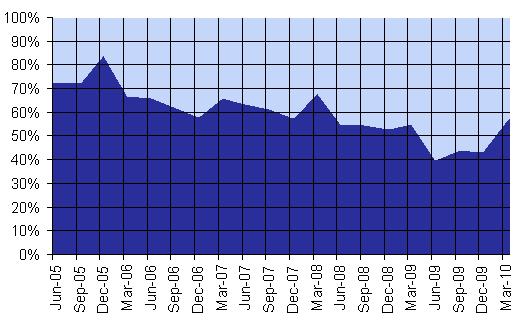
Drawn from data on Scheme Accounts.
I saw the following sign in the back of a 4X4 that sums it all up.
HORN BROKE
WATCH FOR FINGER
Daybreak driver
This morning I had reason to be driving just after daybreak. It is a nice time to be on the road because I had it almost to myself. Driving in the daytime outside of rush hour is one of the benefits of being retired and I always promised myself I would drive everywhere slowly to annoy anyone coming up behind me. That plan never worked because, no matter how slowly I drive, there is always summat even slower in front; forgivably learners and farmers, more often some even slower old fart. Luckily they usually confine their dawdling to rush hours. My early morning drive avoided these delays.
I have noticed that after ten in the evening all thirty speed limits revert to 50mph. What I didn't know was that they do not return to 30 until the next morning rush hour. So at daybreak the few others on the road are all driving as if their lives depend upon it (they do, of course, or at least, someones does) It is due to the philosophy that "If I drive fast I can have an extra five minutes in bed - and eternity in hell."
To drive within the speed limit you need to be an advanced driver (advanced skills or advanced age) The average driver does not have the vaguest idea of either the current speed limit or what speed they are actually driving. This gives rise to the ubiquitous 37mph driver who goes everywhere at the same speed.
 The average excuse of the average driver is that they are keeping up with the (average) traffic! In other words the traffic is keeping up with each other - a kind of boot laces lift over the speed limit.
The average excuse of the average driver is that they are keeping up with the (average) traffic! In other words the traffic is keeping up with each other - a kind of boot laces lift over the speed limit.
The most screw-brained excuse I ever heard was "If I drive within the speed limit I find it harder to concentrate on the road."
Truth is, if you cannot keep your mind on driving when within the speed limit there is no guarantee you will stay aware when over the speed limit - but the consequences will be much worse. It adds up to an admission of incompetence.
Exclusive Bond
Tony Bradley's favourite saying was "You get out of the club what you put into it."
Back in the sixties and seventies an idea that was first introduced almost a century earlier began to take hold in the UK, driven mainly through take up by Tesco. Green Shield Trading Stamps, started by Richard Tompkins, was, for a while, an integral part of the consumer process.
Green Stamps fired inflation. Petrol stations charged more for their fuel but would give triple stamps, quad stamps or even more. The transparent ploy didn't work with canny private motorists and frugal motorcyclists but the garage would pick up all the business drivers who would fill up at high cost, give the receipt to the firm for expenses and pocket the stamps. The cost was just passed on eventually to the customers. You and me. Things have not changed. It is still business users who fuel high petrol prices - pun intended.
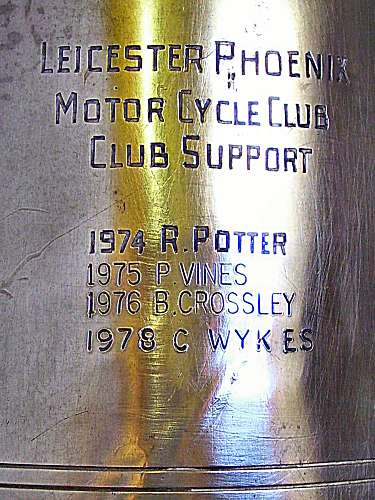
At about this time I was looking for some way of encouraging greater support for club activities. Trading stamps were the model I was looking at. The Exclusive Bond scheme.
Simply giving someone merit points for supporting club nights, runs, rallies and other club events smacks too much of rewarding goody‑goodies and no-one wants to smell with a brown nose. It was also difficult to figure out how to redeem Exclusive Bonds at the end of the season.

It wasn't until I was at the Corby and Kettering MCC in the early eighties that it developed into a working system. The tokens were collected for supporting the club as before; introducing new members, selling fundraising raffle tickets, attending events. The tokens were then all placed into a draw for the main prize. The element of chance neutralised the goody two shoes tarnish and ensured that members who were only able to attend a few events remained motivated. Club member Steve Foster kindly donated a week's holiday on his canal boat as the prize, a popular choice for everyone to hope for. To maintain interest throughout the year there were additional monthly draws for engraved beer mugs. We dropped the pretentious Exclusive Bond title.
I think there is still potential for clubs to generate member enthusiasm above and beyond the joy of taking part. We found it encouraged support when members had the potential to multiply what they put into the club.
Farewell, good friend
Last week I said farewell to a companion who had been a constant support in work and leisure, always keen to join my celebrations and holidays. It was my little Fujifilm FinePix 40i digital camera.
It was given to me for Christmas 2003 by Rachel and the girls. The nifty metalic blue device produced excellent quality photos far beyond what is needed for the website or to illustrate reports at work. There was no zoom but it was usually possible to walk closer if necessary. There were several features that the camera had that I shall miss.
- An optical viewfinder. None of this waving the camera out at arm's length and squinting over my bifocals at a screen with battery sapping antishake system trying to prevent blurring.
- Standard AA batteries, available anywhere at reasonable price. I use the latest "precharged" batteries that I wrote about last year.
- Thankfully, once the flash was turned off it would remain off when the camera was restarted. Few things are more annoying than taking photos of road accident sites and having the flash go off in the eyes of approaching drivers. Sometimes they would stop and demand to know why they were being pinched for speeding! It is no use having a camera that is quick to start if you have to go through the controls to turn off the flash before you can use it.
- The flash was also of the old school - almost akin to ancient magnesium bulbs - that came up to brightness, took the shot and faded. Later cameras seem to have the type that open the shutter, flash the scene and close the shutter. The result is that the Fuji could be used with a remote flash fired by a slave trigger to give some extra bounced lighting and better modelling. I hate flat on, short range, white-out flash.
- I appreciated that the ON switch wasn't hit every time the camera was put back into its case.
By using the same camera all the time for everything I gained familiarity necessary to use it quickly and easily.
We shared some good times. I used to take photos of accident sites, figure out what wanted to be added or taken out, then use Photoshop to superimpose the required "after" results onto the "before" photos. On more than one occasion the engineers came back to me and said "This is already done. Look, it's on your photo!"
The 40i eventually gave in to the nemesis of many a camera, road shake. It is why so few photos exist from the Glory Days. It is why Derek Foster used an Olympus Trip and I had a Rollei B35, small cameras that could be insulated from shocks and shivers in a Belstaff pocket. My 40i died after a particularly screw-loosening bicycle ride round Rutland Water.
What shall I look for in my next camera? My simple wish list is ...
- Small and simple camera.
- Optical viewfinder.
- AA or AAA batteries.
- Quick start-up without priming flash.
- Low light capability (ISO 3200)
If I was still at work I'd also have found useful ...
- GPS to locate the site.
- Gyroscope to identify the direction (available on some smartphones)
- The system that continuously cycles several seconds of photos but only saves the ones taken just before the shutter button is released! (Then I could catch those accidents and some wonderful sports photos)
These are the things I'll try to avoid ...
- Built in batteries that are expensive to replace or to provide a spare.
- Megapixel capability that is only necessary if you want poster sized prints or need to squander space on your hard drive.
- A battery sapping LCD screen that requires a pair of glasses with close reading lens on the left and distance lens on the right and a black hood when the sun is shining.
- Flash that needs to be turned OFF every time the camera is turned ON and after the battery has charged the capacitor for no purpose.
Any recommendations?
Looong shadow
If we are lucky to have any sunshine through the autumn and winter, it is sure to be low to the horizon. If it is shining directly into your face it can make vision a problem. I use a peak on an open face helmet which is a big help. Visors on full face helmets can make vision a nightmare as I noted on the Moors Club Runs page.
When I did accident investigation I took account of time and season when assessing the contributory factors in accidents, referring to a diagram I drew years ago for planning photography shoots. There were a number of fatal accidents that were attributable to sun glare, sometimes made worse by reflection off a damp road surface.
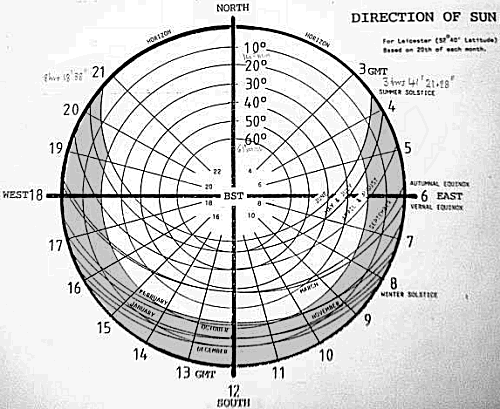
I know you are sensible and take account of reduced vision when the glare is in your face. You don't let the driver behind hurry you, even though you suspect he can hardly see you.
Do you also take extra care when the sun is behind you and you can see perfectly? When you are riding into your long shadow anyone coming the other way, or looking towards you from a junction cannot see you!
Watch out when you are riding into your own looong shadow.
I wear an open face helmet but it has got a visor fitted so, to avoid being blinded, I have adapted by putting a strip of black insulating tape across the top of the visor and by a slight movement of the head can block out the direct sunlight. I have also put a strip across the bottom of the visor to use in the same way when I am riding with the visor open.
- The Black Russian
Accidents are a joke
This week I spent a lot of time sorting the Foz Spot jokes for duplicates. I have re-read pretty nearly all the Foz Spots since 2004 and only about a dozen were duplicated in one form or another.
I have a philosophy that classes accidents with jokes, not because they are funny but because of the way they work.
Generally they both involve a sequence of events leading logically towards an expected conclusion. The actual outcome, an accident or a punch-line, is unexpected but completely logical if you look at the preceding events slightly differently.
How often have you laughed at a joke and thought "I should have seen that one coming". It's just the same with accidents except the thought accompanies regret rather than laughter.
Once you have heard a joke, no matter how long ago, the punch-line twist no longer causes the same funny reaction. Oh, we can appreciate the old ones for their elegance, cleverness and well crafted narrative but they are no longer funny.
We avoid accidents by the same method. Experience. Once you have been (nearly) caught out you won't fall for it again ... unless you are thick and short-lived.
Without a fight
We have an irregular group of cyclists taking to the local roads. They include Mush whose frequently repeated philosophy is "I'm not going over the hill without a fight" and believe me, it takes a fight to get over the hills.
I am one of the bunch - not part of the peloton - just loitering for the pub lunch. Although I've been doing this all season it doesn't get any easier. Was a time when practice would see some improvement but those days are gone. I don't feel stiff or muscular distress next day because that would imply muscles. I just get wobbly after shaking the old threads.
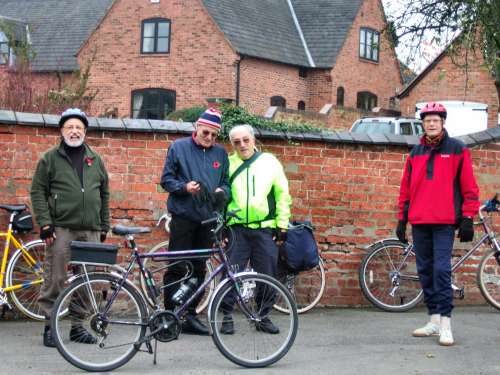
Same thing with my brain. I subscribe to New Scientist and ransack the web to find out how to apply new tricks to LPMCC.net but I'm no longer learning and retaining any of the new stuff. I can barely hang onto the old stuff.
That's why LPMCC.net is so important to me. All my old memories stashed here for the rapidly approaching day when I will read the same pages over and over and they will still seem funny and fresh.
And for the day after that when someone else may read it and think it was all a fiction.
In my beer
As I lifted the tankard to my lips after Christmas dinner, I noticed something dark in my beer that my eyes couldn't quite focus on.
Each time I took a sup it was there and I washed the beer round my tastebuds more than usual so my tongue could feel for a foreign body, just in case I'd taken it in with the draught.
Towards the bottom of the pint I realised what I was looking at - a Christmas Star on the tablecloth pattern refracted through the bottom of my tankard.
Cheers! Have a merry Christmas.
- Ben Crossley
 I also have one of those ... and it's not for sale!
I also have one of those ... and it's not for sale!

